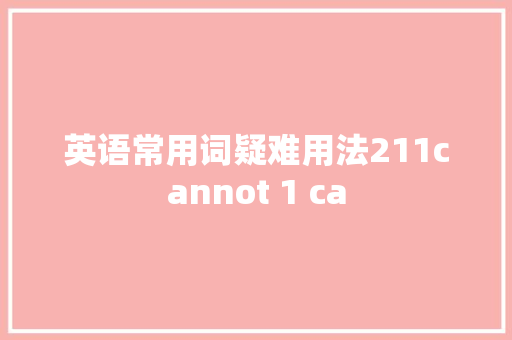(1) cannot (could not) 与too连用,意思不是“不能太过”,而是“再...不过”、“无以复加”(这里的cannot不是“不应该”,而是“不可能有此情形”)。这一点,中国人随意马虎出错。
You can't be too careful. 你千万要小心。(直译:“你无论多么小心也不过分。”不是“你不能过分小心。”)有时候too可以先于cannot或could not。
And too much importance can't be placed on the value of meeting with a prospective doctor face to face. (Saratoga Parent, May 31, 2002) 而且,同一位物色中的年夜夫面对面交谈,其代价是无论如何看重都不为过的。
(2) cannot(紧张用could not形式)与形容词或副词比较级连用,也有“无以复加”的意思。

Things couldn't be better. 情形再好不过了。
I couldn't agree with you more. 你的见地,我完备赞许。
But intelligence officials and experts say that could not be further from the truth. (US News & World Report, Aug. 12, 2002, p. 18) 但是情报官员和专家说那与事实完备不符。
You couldn't be more mistaken.你大错特错了。
He could not have cared less. 他根本不放在心上。
For many businesses, the loss of telephone service Thursday couldn't have come at a worse time. 对付许多企业来说,星期四电话不通,韶光是最不凑巧的了。
The candidates could not be at a greater distance on this issue. 各个候选人在这个问题上彼此的间隔极大。
They couldn't think any worse of him than they already did.(John Darnton, The Darwin Conspiracy, p. 189) 他们对他的印象,已经坏到无以复加了。
The contrast between the morning paper and the news on radio and television could not have been more dramatic this morning. 本日上午拿凌晨报纸和广播电视新闻比拟一下,反差大极了。与表示“过分”的动词连用,也有这种情形。
The awful toll exacted on the soldiers and citizens cannot be exaggerated. 军人和平民伤亡惨重,不计其数。祝贺人家结婚,可以说:It couldn't happen to two nicer people. 直译:“这样的好事,不会有更美满的一对能碰着的了。”意译:“天生一对,地造一双。”或:“天作之合。”拜会overemphasize与overestimate条。这种用法,中国人比较难明得,理解了也较难驯熟节制,须要特殊把稳。